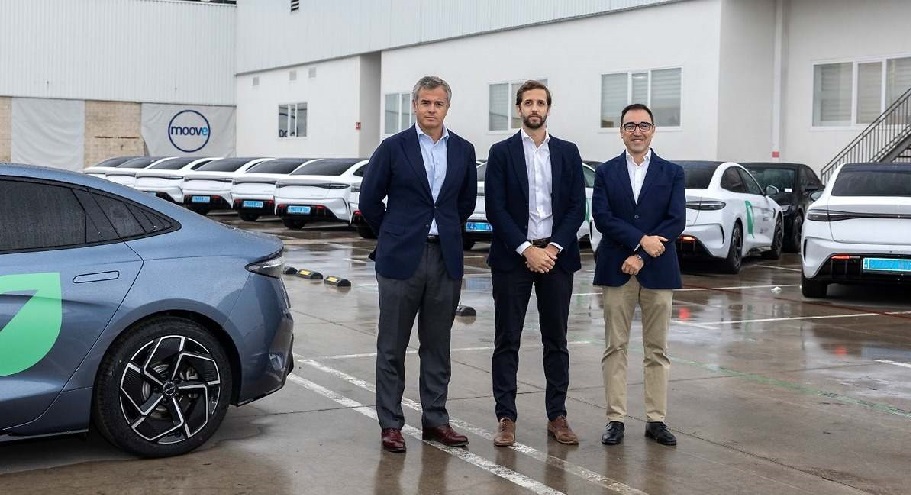Business
Chinese EV Maker BYD Gains Rapid Market Share in Spain Amid Growing Competition
Amado Panganiban
05 Nov, 2025

In Barcelona, Javier Hernandez, a 51-year-old excavator operator, recently chose a plug-in hybrid vehicle from China’s BYD, citing its competitive price nearly 10,000 euros lower than comparable European models. Seeking an affordable and versatile option for both city driving and trips to the Catalan mountains, Hernandez overcame his initial skepticism about Chinese electric vehicles due to unfamiliarity with the brand.
With government incentives, the BYD Seal U DM-I starts at roughly 30,000 euros in Spain, significantly less than the over 40,000 euros price tags of similarly equipped VW Tiguan and Peugeot 3008 plug-in hybrids. Hernandez remarked, "The value for money was better, I tried it out and they could give it to me right away."
Cost-conscious consumers like Hernandez are fueling impressive growth for Chinese EV manufacturers such as BYD across Spain and broader Europe. This growth is intensifying competition with established players including Tesla, Stellantis, and Volkswagen.
BYD’s country manager for Spain and Portugal, Alberto De Aza, emphasized the importance of affordability, stating, "Until the arrival of BYD, if you wanted to buy an electric vehicle, you had to spend a hell of a lot of money." He further noted the rapid expansion of BYD’s dealer network in Spain, which nearly quadrupled to around 100 outlets from only 25 dealers the previous year, supported by aggressive marketing and promotional discounts.
In contrast, legacy car brands are experiencing a downturn in dealership presence. Data from industry association Faconauto indicates that dealerships for traditional brands have dropped from 2,164 in 2014 to 1,648 in 2024, with Volkswagen and Audi alone seeing a 40% reduction in dealerships during this period. Markus Haupt, interim CEO of SEAT, a VW subsidiary, acknowledged the intensified pressure from Chinese competitors, saying, "Chinese competitors are increasing the pressure, and not just on us."
BYD has also made notable strides in market share. As of July, the company holds more than 10% of Spain’s EV market, encompassing both fully electric and plug-in hybrid vehicles. This figure is over twice the company’s European average and almost three times higher than Tesla’s 3.3% share. Furthermore, BYD’s total share of Spain’s overall car market rose from 0.3% last year to 1.8% through August, surpassing brands like Jeep and Volvo. The BYD Seal U has become the best-selling plug-in hybrid in Spain so far this year.
Despite these gains, BYD still trails behind leading automakers such as Toyota, Renault, and Volkswagen in overall sales.
Spain’s automotive market conditions favor this Chinese expansion, analysts say, noting the country lacks a major domestic vehicle manufacturer. Felipe Munoz, an analyst at JATO Dynamics, explained, "Spain doesn’t have a strong local carmaker. SEAT has lost some of its Spanish identity since being acquired by Volkswagen and appears most vulnerable." SEAT’s sales have increased by just 4% this year, lagging behind the market’s 15% growth, with its sister brand Cupra slightly outperforming at 17% sales growth.
Chinese brands overall are growing rapidly: SAIC-owned MG experienced a 58% increase in sales, and Chery’s Omoda more than doubled its sales year-on-year in Spain through August. BYD’s sales surged 675% to over 14,000 vehicles in the same period.
With fierce competition at home, Chinese EV manufacturers are focusing on Europe for growth. BYD plans to localize all European EV production within three years, constructing a factory in Hungary. Spain, with its developed industrial infrastructure and low electricity costs, is considered a promising expansion site, according to De Aza.
However, challenges remain. While electric and plug-in hybrid vehicles accounted for 21% of Spanish car sales in July — up from 10% the previous August — this remains below the European average of 27%. A key barrier is the limited charging infrastructure, with Spain having approximately 50,000 charging points, roughly one-third the number of the Netherlands despite having a larger population.
Consequently, Spanish consumers currently favor hybrids and plug-in hybrids, which are central to BYD’s European market strategy. Juan Gonzalez, a 56-year-old IT department head who owns solar panels capable of charging any EV, chose a BYD plug-in hybrid citing concerns about longer trips. "If you run out of battery and you have to tackle a mountain pass, you’re really in trouble," he explained.
The rapid adoption of affordable Chinese EVs signals a shifting landscape in Spain’s automotive market, as traditional manufacturers confront growing competition from new entrants leveraging cost advantages and expanding distribution networks.
Recommended For You

Domingo and Fajardo Clash for IBF Asia Flyweight Title in Manila
Nov 05, 2025
Dorotea Balagtas

Peaceful Anti-Corruption Protest Held in Cebu City with No Reported Unrest
Nov 05, 2025
Amado Panganiban

Manila Protest Turns Violent: Over 70 Arrested, Nearly 90 Police Injured
Nov 05, 2025
Juancho Mabini

Chinese Stocks Rise Amid Positive US-China Dialogue and Tech Sector Gains
Nov 05, 2025
Dorotea Balagtas
